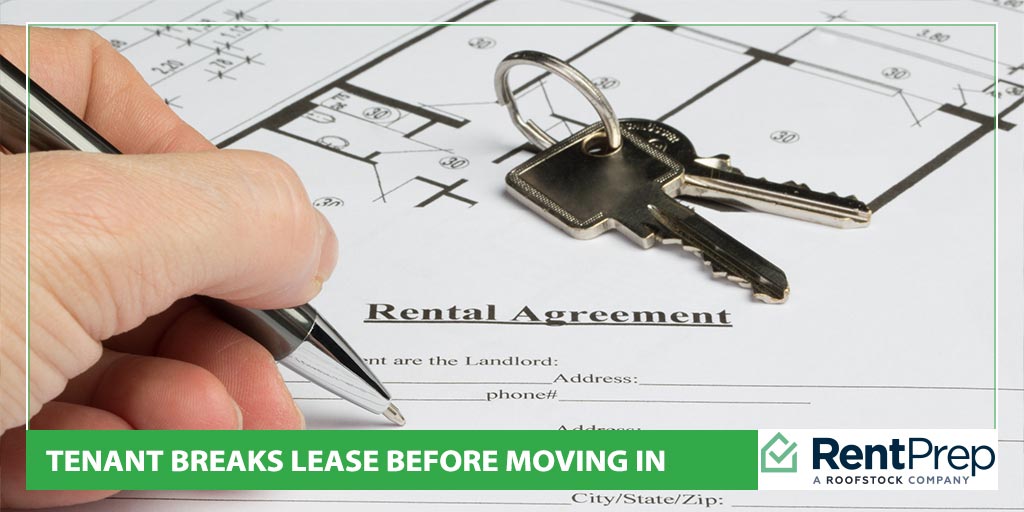
Updated September 2023
You’ve recently gone through the lengthy process of finding and screening a new tenant for your rental property. Both parties have signed the lease. But then the tenant suddenly contacts you to let you know about their change of plans and that they no longer intend to move in. As a landlord, what should you do?
What are your legal obligations when a tenant terminates their lease early? And what steps can you take to protect your financial interests and find a new tenant as quickly as possible?
Spoiler alert! Legally, the tenant is bound by the contract they signed and is therefore responsible for the rent until the end of the lease. However, most states have a “good faith” law that requires the landlord to actively look for a new tenant to release the unwilling tenant from the burden of the lease.
While you may be fulfilling your end of the agreement, what should you do if the tenant breaking the lease refuses to fulfill their financial responsibilities? Or what if you are the one who wants to break the lease before the new tenant moves in? We’ll answer these questions and more in today’s guide.
Table Of Contents: Can Tenants Break The Lease Before Moving In?
In order to deal with situations like this, you need to know your legal rights and obligations and also the limits of the law that are designed to protect both you and the tenant.
- What Happens When A Tenant Breaks Their Lease Before Moving In?
- How To Write An Early Lease Termination Letter
- Tenant Breaking A Lease Before Moving In: Landlord Options
- Can Landlords Break A Lease Before Tenants Move In?
- When Tenants Cancel A Lease Before Moving In: FAQs
- A Landlord’s Rights When A Tenant Breaks The Lease Agreement
- Real-Life Example: Tenant That Wants To Break The Lease Early
What Happens When A Tenant Breaks Their Lease Before Moving In?

Once you’ve found and vetted a new tenant for your property, it can be a big relief to have that rental agreement signed. The signing of the lease is the start of a legally binding contract between you and the tenant, even if they are not yet occupying the property.
This means that if the tenant notifies you they’ve changed their mind and will no longer be moving in, you should treat this as a notification of their intention to break the lease.
The consequences of breaking the lease should be clearly stated in your rental contract. This can include fees that the tenant should pay to help offset the cost of finding a new tenant sooner than expected.
In most cases, the tenant is responsible for paying the rent until the date they agreed to in the signed lease. It’s a legally binding contract. The only exception is if the landlord has not fulfilled their obligations, such as providing the property in a habitable state. If the tenant can prove that claim, they would not be liable for the rent.
However, state laws encourage you to find a new tenant as soon as possible. When you sign a lease agreement with a replacement tenant, the previous lease becomes null and void, and the old tenant is no longer liable for the rent.
That’s what the law says, but what should you do as a landlord when a tenant lets you know they do not intend to move in?
1. Ask For Documentation
Ask the tenant to provide written documentation of their intention to break the lease, in the form of a 30-day notice. You will require this document for your records.
This letter should include the reason for terminating the lease and details for how the landlord can contact the tenant to resolve any outstanding issues.
2. Explain Next Steps
Explain to the tenant that the conditions of their lease agreement mean they are legally liable for rent for the entire lease term. However, you should inform them that you’ll try to re-rent the property as soon as possible as part of the good faith effort required by most states. The tenant is responsible for paying rent until your property is rented out again, regardless of whether they have ever lived there.
Side Note: If someone who is an active member of the military is called up for active duty for more than 90 days, their lease agreement becomes null.
3. Try To Find A New Tenant
Most states require a good-faith effort on your part to find a new tenant as quickly as possible. This means you should begin marketing the property immediately and sign a new lease agreement with a new tenant as soon as you can.
Once you have a new rental contract in place, the old lease is no longer valid. Even though the former tenant signed a lease but never moved in, we recommend signing an early lease termination letter with them. This will ensure that the terms of this termination are clearly documented.
The tenant can help you find a new tenant to take over their lease and request that you transfer the lease to the new tenant’s name. You can still charge the new tenant an application fee to conduct proper screening before agreeing to the lease transfer.
How To Write An Early Lease Termination Letter
An early lease termination letter is an addendum to a lease agreement that is signed by both parties. This letter states that the lease will be considered null and void as of a specific date. It should also include details of any fees owed and how they will be collected.
This document is extremely important if there is any disagreement between you and the tenant about money owed that needs to be resolved by the court.
This letter will serve as legal documentation for the end of the lease. If the tenant does not pay what they owe, this letter will be useful in pursuing the collection of any overdue rent and fees. Any employed property manager can help with this process, but we also have a copy of an early termination letter you can customize.
Adding An Early Termination Of Lease Clause
If you’re worried about a tenant backing out before they move in, it might be a good idea to ensure your standard lease includes a clear termination clause. This clause can cover what will happen if the tenant wants to back out of the lease early.
The clause may simply state that the tenant is responsible for paying rent until the end of their lease or a new tenant is found, whichever happens first. However, some landlords choose to have a specific termination fee that ends the lease. This can be an attractive option for properties that are in high demand to avoid having to chase the unwilling tenant for funds.
Tenant Breaks A Lease Before Moving In: Landlord Options
While the step-by-step process given above is the standard procedure that can be followed when a tenant breaks a lease before they move in, you have other options. Ultimately, it’s up to you to decide which option best suits your situation.
If the property you’re dealing with was difficult to rent or you made a lot of concessions in order to rent to this tenant, it’s best to follow the standard protocol. This protocol simply follows the contract you and the tenant both signed. It ensures you will not lose out financially. While it may seem harsh, the tenant also signed this legal contract.
But if you have a property you’re likely to be able to rent out quickly, there are other things you can do when a tenant comes to you saying, “I signed a lease but changed my mind.” Below are some tips to consider when a tenant decides to terminate their lease early.
Allow Early Termination

Does your lease agreement allow for early termination? If so, your tenant has the right to use this early termination clause at any time as long as they follow the protocol outlined in the lease.
Usually, this means they’ll need to pay a fee in order to end the rental agreement early, and they may also forfeit their security deposit. Once the termination has occurred, both parties can continue with their business as usual.
If you’re in a position to do so, it’s usually easier to end the lease agreement without fighting for rent than it is to pursue rent collection from an unwilling tenant. However, every situation is different, so be careful about making this choice.
Tenants who get a job in a different city, for example, lose their job and cannot make rent, or are otherwise in a changing situation that’s out of their control may not be able to keep paying rent. Rather than holding onto the hope that they’ll be able to find the money, it’s usually best to cut your losses and move on.
If both parties agree, it’s legal to end the lease at any time. You can decide to do this if you feel it won’t hurt your business too much.
What Happens To The Security Deposit When A Tenant Breaks Their Lease?
When signing their rental contract, the tenant should also pay a security deposit to cover any potential damage to the property once they move out. But if they break their lease before actually moving in, they cannot be held responsible for any damages, so this security deposit should be returned to them.
Some landlords choose to include forfeiting the security deposit as a condition of early termination of a lease agreement. Others choose to start charging against the security deposit for rent owed. The landlord is then left in the position of returning any remaining security deposit to the tenant or pursuing them for additional funds not covered by the deposit.
However, some states, such as California and Texas, specifically do not allow for security deposits to be used to cover unpaid rent. This protects the integrity of the tenant’s deposit and the landlord, as tenants cannot refuse to pay rent near the end of their contract by claiming that it’s already been covered by the security deposit.
It’s always a good idea to double-check your state and local landlord-tenant laws before using the security deposit to cover anything but damages to the property.
Can The Tenant Back Out Of A Lease Within 3 Days Of Signing?
When the tenant doesn’t get their deposit back immediately or wants to give you an earful when you stand your ground on rent responsibility, they may invoke a “right to rescind.”
This refers to a consumer protection law that requires financial lenders to allow borrowers to back out of a loan under certain circumstances within three days of signing.
Unfortunately for the tenant, this right does not relate in any way to lease agreements and rental properties.
If the tenant tries to convince you of this policy, go ahead and debunk the notion that there is a right to rescind or cancel a lease agreement within three days.
Can Landlords Break A Lease Before Tenants Move In?
If you sign a lease agreement with a tenant but then, before they move in, decide that you can no longer rent them the property, you are also breaking the legally binding contract.
To break a lease as the landlord, whether the tenant has moved in or not, you must provide a justification that’s acceptable under local laws. Even then, you’re still required to give the tenant 30-60 days to find a new home. So, if the tenant is scheduled to move into your property within that window, you may still be required to let them do so.
You can speak to the tenant and come to an agreement with a different justification or a shorter period to find a new home. However, the tenant is not legally required to break the lease at your request.
When Tenants Cancel A Lease Before Moving In: FAQs
When a tenant decides to cancel a lease before ever moving into the rental property, it can cause quite a bit of confusion, especially regarding a landlord’s rights.
Can you keep the security deposit if the tenant cancels the lease?
In most cases, the landlord can keep the security deposit if a tenant backs out. The exact terms on whether or not this is possible will depend on two things:
- What is written in the lease agreement
- What state and local laws say about security deposits
If your local laws allow you to use the security deposit to cover unpaid rent when a tenant backs out before moving in, you should consider writing this into your standard lease. Having it included in the agreement that you and your tenant sign will make it easier to explain this to them should this situation occur.
However, if your property is located in a place where the security deposit can never be used to cover rent, it will need to be returned to the tenant in full once the lease period is over or the property is re-rented. If you find yourself in this situation, it’s likely that you’ll need to go to civil court to resolve the rent nonpayment and property abandonment.
From there, a judge can advise you on how to pursue rent collection and what to do with a security deposit.
Does breaking a lease hurt a tenant’s credit rating?
Tenants who are caught in a tricky situation may be worried about whether breaking the lease will affect their credit. Some may turn to you for advice. While you should point them to a financial expert for information, it’s good to know the basics.
If a tenant backs out and does not pay rent after signing a lease, they are still responsible for any unpaid rent. As the landlord, you can file suit to get that rent back. If you win the suit, you may then pass the debt to a collection agency. Unpaid debt that goes through collections can have an effect on a tenant’s credit score.
Ultimately, this means a tenant’s credit could be hurt by them backing out of a lease, if they do not meet a resolution with the landlord or pay what they owe.
Can a tenant change their mind before signing a lease?
While it’s frustrating for the landlord, a tenant can change their mind anytime before signing a lease. Until the contract is signed, there is nothing legally binding them to rent the property, and they cannot be forced to do so.
If a tenant has already paid a security deposit before they change their mind, you should return this money to them in full if they do not sign the lease. There was no agreement in place, so them giving you the security deposit early was a mistake on their part, but it would be wrong to keep this money.
Once they’ve signed a lease but don’t want to move in, however, it’s within your rights to pursue rent collection.
Do I have to let a tenant sublease?
If your tenant no longer wants to move into the home they rented but they also don’t want to pay rent on the vacant property, they may consider subleasing.
Your lease agreement should include a clause regarding whether you allow subleasing and under what conditions. In most states, landlords cannot refuse a sublease without good reason.
Bear in mind that subletting is different from subleasing. In the case of subletting, the tenant finds a new tenant to take over their lease and you enter into a new contract with the new tenant. By contrast, if your tenant subleases, they continue to be responsible for the rental property, including paying the rent and any damages, but they do this by renting the property to another person.
Are tenants still liable to pay rent if they haven’t paid their security deposit?
If a tenant has not yet paid a security deposit, but they have already signed the lease, they are still beholden to the legally binding contract and to pay the rent. However, if you have not yet collected the security deposit, it can be challenging to recoup the money.
A Landlord’s Rights When A Tenant Breaks A Lease
Life is full of the unexpected, so sometimes a tenant will sign a lease in good faith but find that it’s no longer feasible for them to move in. If your property is in high demand, this may not be of great concern since you can probably find a new tenant easily. However, if you’re working with a challenging property, this can be a major blow. You’ll need to invest more time and money to find a new tenant.
Legally, once the lease agreement is signed, you and the tenant are in a binding contract. This means they are liable for the rent on the property until the end of the contract. However, most states have a law in place that requires landlords to look for a new tenant to take over the lease as soon as possible.
While the law is clear-cut, making this work in practice can be challenging. You should outline the consequences of breaking the lease in the contract so that it’s clear to both you and the tenant. However, tenants are not always willing to pay, so you may need to pursue what they owe you through legal means.
While the security deposit that should have been paid when the rental agreement was signed exists to cover unexpected expenses such as this, not all states allow landlords to use security deposits to cover rent owed. Before relying on this as a safety net, check your local laws.
Real-Life Example: Tenant Who Wants To Break The Lease Early
In Episode #164 of the RentPrep For Landlords Podcast, we dive into different issues that landlords call our company about. On a recent podcast, we actually discussed a real-life example of a tenant wanting to break the lease before moving in.
You can tune in below to hear how that story progressed.
Subscribe: Apple Podcasts | Android | Google Play | Stitcher | TuneIn | RSS




